








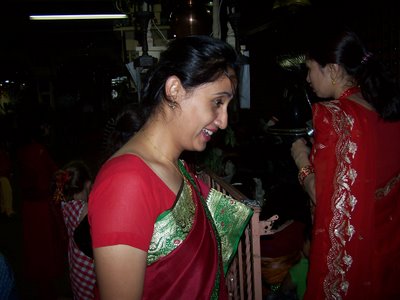








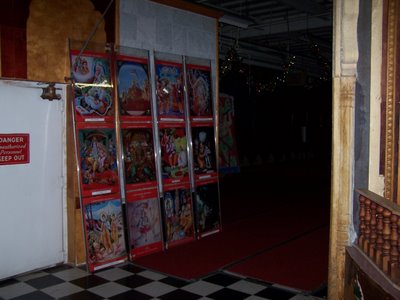
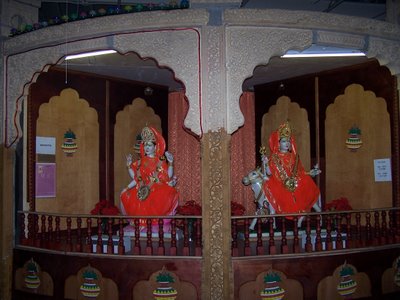


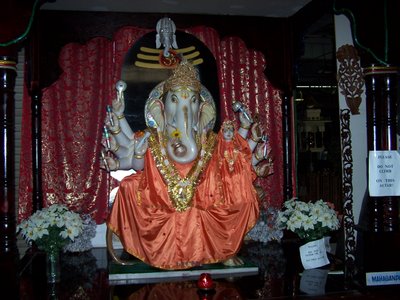

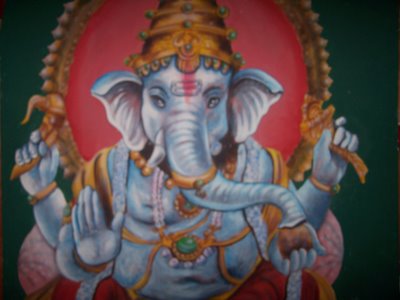
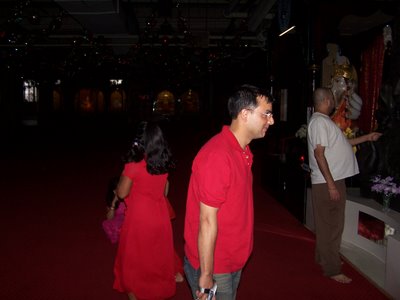








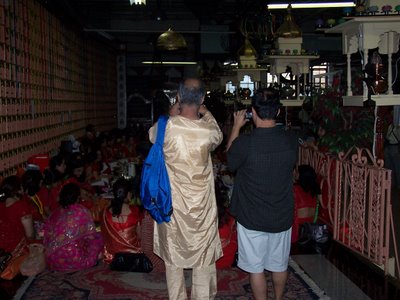






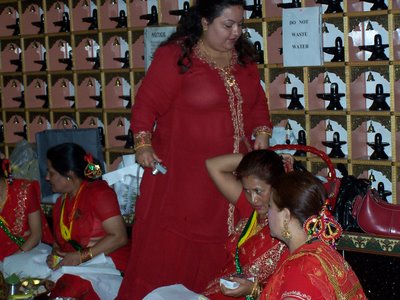
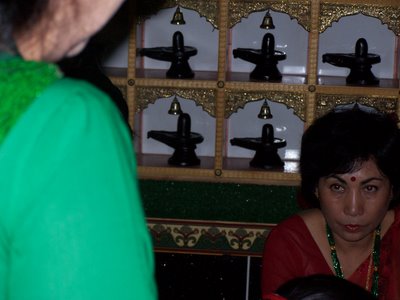




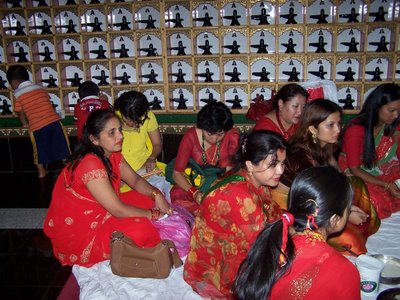


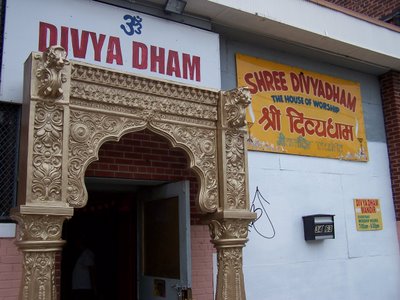
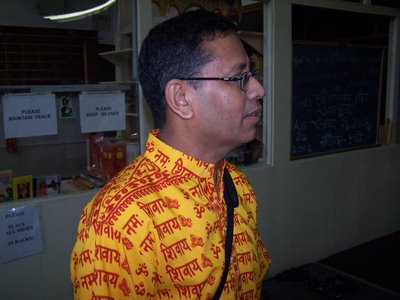



Divya Dham Hindu Temple in New York - Hindu Temples in New York
The only full timer out of the 200,000 Nepalis in the US to work for Nepal's democracy and social justice movements in 2005-06.

कार्यपालिका
कार्यकारिणी अधिकार
-१) नेपालको कार्यकारिणी अधिकार यो संविधान र अन्य कानुनबमोजिम मन्त्रिपरिषद्मा निहित हुनेछ ।
-२) यो संविधान र अन्य कानुनको अधीनमा रही नेपालको शासन व्यवस्थाको सामान्य निर्देशन, नियन्त्रण र सञ्चालन गर्ने अभिभारा मन्त्रिपरिषद् उपर हुनेछ ।
-३) नेपालको कार्यकारिणी कामहरू नेपाल सरकारको नाममा हुनेछ ।
-४) उपधारा -३) बमोजिम नेपाल सरकारको नाममा हुने निर्णय वा आदेश र तत्सम्बन्धी अधिकारपत्रको प्रमाणित कानुनद्वारा व्यवस्था भएबमोजिम हुनेछ ।
मन्त्रिपरिषद्को गठनः
-१) व्यवस्थापिकामा बहुमत प्राप्त व्यवस्थापिकाको सदस्य प्रधानमन्त्री पदमा निर्वाचित भएको मानिनेछ र निजको अध्यक्षतामा मन्त्रिपरिषद् को गठन हुनेछ ।
-२) मन्त्रिपरिषद्मा आवश्यकताअनुसार उपप्रधानमन्त्री र अन्य मन्त्रीहरू रहनेछन् ।
-३) प्रधानमन्त्रीले व्यवस्थापिकाका सदस्यहरू मध्येबाट आवश्यकताअनुसार उपप्रधानमन्त्री र मन्त्रीहरू नियुक्त गर्न सक्नेछ ।
-४) प्रधानमन्त्रीले मन्त्री नियुक्ति गर्दा सम्बन्धित दलको सिफारिसमा नियुक्ति गर्नु पर्नेछ ।
-५) प्रधानमन्त्री र अन्य मन्त्रीहरू व्यवस्थापिकाप्रति सामूहिक रूपमा उत्तरदायी हुनेछन् र मन्त्रीहरू आफ्ना मन्त्रालयको कामका लागि व्यक्तिगतरूपमा प्रधानमन्त्री र व्यवस्थापिकाप्रति उत्तरदायी हुनेछन् ।
-६) देहायका अवस्थामा प्रधानमन्त्री आफ्नो पदबाट मुक्त हुनेछ ः-
-क) व्यवस्थापिकाको अध्यक्षसमक्ष लिखित राजीनामा दिएमा,
-ख) व्यवस्थापिकाको सम्पूर्ण सदस्य संख्याको दुई तिहाई बहुमतले धारा.....बमोजिम निजका विरुद्ध अविश्वासको प्रस्ताव पारित भएमा,
-ग) निज व्यवस्थापिकाको सदस्य नरहेमा, वा
-घ) निजको मृत्यु भएमा ।
-७) उप-प्रधानमन्त्री, मन्त्री, राज्यमन्त्री तथा सहायक मन्त्री देहायका अवस्थामा आफ्नो पदबाट मुक्त हुनेछन् ः-
-क) निजले प्रधानमन्त्रीसमक्ष लिखित राजीनामा दिएमा, वा
-ख) उपधारा -६) बमोजिम प्रधानमन्त्री आफ्नो पदबाट मुक्त भएमा, वा
-ग) प्रधानमन्त्रीले पदमुक्त गरेमा,
-घ) निजको मृत्यु भएमा ।
-८) उपधारा -६) बमोजिम प्रधानमन्त्री आफ्नो पदबाट मुक्त भए पनि अर्को मन्त्रिपरिषद् गठन नभएसम्म मन्त्रिपरिषद्ले कार्य सञ्चालन गरी रहनेछ । तर प्रधानमन्त्रीको मृत्यु भएमा नयाँ प्रधानमन्त्रीको निर्वाचन नभएसम्मका लागि उपप्रधानमन्त्री वा वरिष्ठ मन्त्रीले प्रधानमन्त्रीको रूपमा कार्य सञ्चालन गर्नेछ ।
राज्यमन्त्री र सहायक मन्त्री ः
-१) प्रधानमन्त्रीले व्यवस्थापिकाको सदस्यहरू मध्येबाट राज्यमन्त्री नियुक्त गर्न सक्नेछ ।
-२) प्रधानमन्त्रीले कुनै मन्त्रीलाई निजको कार्यभार सञ्चालनमा सहायता गर्न व्यवस्थापिकाको सदस्य मध्येबाट सहायक मन्त्री नियुक्त गर्न सक्नेछ ।
-३) धारा .... ... को उपधारा .... मा मन्त्रीका सम्बन्धमा उल्लिखित कुराहरू राज्यमन्त्री र सहायक मन्त्रीका हकमा पनि लागू हुनेछन् ।
व्यवस्थापिकाको सदस्य नभएको व्यक्ति मन्त्री पदमा नियुक्त हुन सक्ने ः
धारा ... र ... मा जुनसुकै कुरा उल्लेख भए तापनि प्रधानमन्त्रीले व्यवस्थापिकाको सदस्य नभएको कुनै व्यक्तिलाई उपप्रधानमन्त्री, मन्त्री, राज्यमन्त्री र सहायक मन्त्री पदमा नियुक्त गर्न सक्नेछ ।
पारिश्रमिक तथा अन्य सुविधाहरू
प्रधानमन्त्री, उप-प्रधानमन्त्री, मन्त्री, राज्यमन्त्री र सहायक मन्त्रीहरूको पारिश्रमिक र अन्य सुविधाहरू ऐनद्वारा निर्धारण हुनेछ । सोबमोजिम ऐनद्वारा निर्धारण नभएसम्म नेपाल सरकारले तोकेबमोजिम हुनेछ ।
शपथ
प्रधानमन्त्रीले व्यवस्थापिकासमक्ष र उपप्रधानमन्त्री, मन्त्री, राज्य मन्त्री तथा सहायक मन्त्रीले प्रधानमन्त्रीसमक्ष आफ्नो पद र गोपनीयताको शपथ ग्रहण गर्नुपर्नेछ ।
नेपाल सरकारको कार्य सञ्चालन
-१) नेपाल सरकारबाट स्वीकृत नियमावलीबमोजिम नेपाल सरकारको कार्य विभाजन र कार्य सम्पादन हुनेछ ।
-२) उपधारा -१) अन्तर्गतको नियमावलीको पालना भयो वा भएन भन्ने प्रश्न कुनै अदालतमा उठाउन सकिने छैन ।
संविधानसभाको गठन भएपछिको मन्त्रिपरिषद् संविधानसभाको गठन भएपछि कार्यकारिणी अधिकारको प्रयोग, मन्त्रिपरिषद्को गठन र तत्सम्बन्धी अन्य कुरा आवश्यक हेरफेरसहित यसै भागमा लेखिएको व्यवस्थाबमोजिम हुनेछ ।
भाग ७
व्यवस्थापिका
व्यवस्थापिकाको गठन
-१) नेपालमा एक व्यवस्थापिका रहनेछ जसमा देहाय बमोजिमका.....सदस्य रहनेछन् ः-
-क), -ख), -ग), -घ) इत्यादि ।
-२) व्यवस्थापिकाको कार्यकाल संविधानसभाको पहिलो बैठक बसेपछि समाप्त हुनेछ ।
-३) व्यवस्थापिकाको कुनै सदस्यको स्थान कुनै कारणले रिक्त भएमा बाँकी अवधिका लागि जुन राजनीतिक दल वा समूहबाट प्रतिनिधित्व भएको हो सोही राजनीतिक दल वा समूहबाट उपधारा -१) बमोजिमको प्रक्रियाबाट मनोनयन भई रिक्त स्थान पूर्ति हुनेछ ।
सदस्यका लागि योग्यता
-१) व्यवस्थापिकाको सदस्य हुनका लागि कुनै पनि व्यक्ति-
-क) नेपालको नागरिक हुनुपर्छ,
-ख) पच्चीस वर्ष उमेर पूरा भएको हुनुपर्छ,
-ग) कुनै कानुनले अयोग्य हुनु हँुदैन,
-घ) जनआन्दोलनको भावनाप्रति प्रतिबद्ध भएको हुनुपर्छ,
-ङ) कुनै लाभको पद धारण गरेको हुनुहुँदैन ।
स्पष्टीकरण ः यस खण्डको प्रयोजनका लागि 'लाभको पद' भन्नाले निर्वाचित वा मनोनयनद्वारा पूर्ति गरिने राजनीतिक पदबाहेक सरकारी कोषबाट पारिश्रमिक वा आर्थिक सुविधा पाउने अन्य पद सम्झनु पर्छ ।
सदस्यको अयोग्यतासम्बन्धी निर्णय व्यवस्थापिकाको कुनै सदस्य धारा......अनुसार अयोग्य छ वा हुन गएको छ भनी प्रश्न उठेमा त्यसको अन्तिम निर्णय व्यवस्थापिकाले गर्नेछ ।
स्थान रिक्तता
व्यवस्थापिकाको सदस्यको स्थान देहायको अवस्थामा रिक्त हुनेछः-
-क) लिखित राजीनामा दिएमा,
-ख) धारा....बमोजिम निजको योग्यता नभएमा,
-ग) सदनको स्वीकृति नलिई लगातार दसवटा बैठकमा अनुपस्थित रहेमा,
-घ) जुन राजनीतिक दलबाट प्रतिनिधित्व गरेको हो सो राजनीतिक दल त्यागेको सूचना सम्बन्धित दलले जानकारी गराएमा,
-ङ) व्यवस्थापिकाको कार्यकाल पूरा भएमा वा
-च) निजको मृत्यु भएमा,
शपथ
व्यवस्थापिकाको प्रत्येक सदस्यले व्यवस्थापिकाको सभामा पहिलोपटक भाग लिनुभन्दा अघि निर्धारित रूपमा शपथ लिनुपर्नेछ ।
व्यवस्थापिकाको अध्यक्ष र उपाध्यक्ष
-१) व्यवस्थापिकाले आफ्ना सदस्यमध्येबाट एकजना अध्यक्ष र एकजना उपाध्यक्षको निर्वाचन गर्नेछ । अध्यक्ष वा उपाध्यक्षको पद रिक्त भएमा व्यवस्थापिकाले आफ्नो सदस्यहरू मध्येबाट निर्वाचन गरी रिक्त स्थानको पूर्ति गर्नेछ ।
-२) व्यवस्थापिकाको अध्यक्ष र उपाध्यक्ष एउटै राजनीतिक दलको सदस्य हुनसक्ने छैन ।
-३) व्यवस्थापिकाको अध्यक्षको अनुपस्थितिमा उपाध्यक्षले व्यवस्थापिकाको बैठकको अध्यक्षता गर्नेछ ।
-४) व्यवस्थापिकाको अध्यक्ष र उपाध्यक्षको निर्वाचन नभएको वा दुवै पद रिक्त रहेको अवस्थामा व्यवस्थापिकाको बैठकको अध्यक्षता उपस्थित सदस्यहरूमध्ये उमेरको हिसाबले जेष्ठ सदस्यले गर्नेछ ।
-५) व्यवस्थापिकाको अध्यक्ष वा उपाध्यक्षको पद देहायको अवस्थामा रिक्त हुनेछ ः
-क) निज व्यवस्थापिकाको सदस्य नरहेमा,
-ख) निजले लिखित राजीनामा दिएमा,
-ग) निजले पद अनुकूल आचरण गरेको छैन भन्ने प्रस्ताव व्यवस्थापिकाको तत्काल कायम रहेका सम्पूर्ण सदस्य संख्याको दुईतिहाइ बहुमतबाट पारित भएमा,
-६) व्यवस्थापिकाको अध्यक्षले पद अनुकूलको आचरण गरेको छैन भन्ने प्रस्ताव उपर छलफल हुने बैठकको अध्यक्षता उपाध्यक्षले गर्नेछ । सो प्रस्तावको छलफलमा अध्यक्षले भाग लिन र मतदान गर्न पाउनेछ ।
अधिवेशनको आह्वान र अन्त
-१) प्रधानमन्त्रीले अगाडि नै व्यवस्थापिकाको अधिवेशन आह्वान गरेकोमा बाहेक यो संविधान प्रारम्भ भएको एक्काइसौं दिन प्रधानमन्त्रीले तोकेको ठाउँ र समयमा व्यवस्थापिकाको अधिवेशन आह्वान गर्नेछ । त्यसपछि समय-समयमा प्रधानमन्त्रीले अन्य अधिवेशनको आह्वान गर्नेेछ ।
-२) व्यवस्थापिकाको अध्यक्षको परामर्शमा प्रधानमन्त्रीले व्यवस्थापिकाको अधिवेशनको अन्त गर्नेछ ।
-३) व्यवस्थापिकाको अधिवेशन चालू नरहेको वा बैठक स्थगित भएको अवस्थामा अधिवेशन वा बैठक बोलाउन वाञ्छनीय छ भनी व्यवस्थापिकाको सम्पूर्ण सदस्य संख्याको एक चौथाइ सदस्यले लिखित अनुरोध गरेमा त्यस्तो अधिवेशन वा बैठक बस्ने मिति र समय प्रधानमन्त्रीले तोक्नेछ र त्यसरी तोकिएको मिति र समयमा व्यवस्थापिकाको अधिवेशन प्रारम्भ हुने वा बैठक बस्नेछ ।
प्रधानमन्त्रीबाट सम्बोधन
प्रधानमन्त्रीले व्यवस्थापिकाको बैठकलाई सम्बोधन गर्न र त्यसको निमित्त सदस्यहरूलाई उपस्थित हुन लिखित सूचना जारी गर्नेछ ।
गणपूरक संख्या
यस संविधानमा अन्यथा लेखिएकोमा बाहेक व्यवस्थापिकाको कुनै पनि बैठकमा सम्पूर्ण सदस्य संख्याको एक चौथाइ सदस्य उपस्थित नभएसम्म कुनै प्रश्न वा प्रस्ताव निर्णयार्थ प्रस्तुत गरिने छैन ।
सदस्यको स्थान रिक्त रहेको अवस्थामा बैठकको कार्य सञ्चालन
व्यवस्थापिकाको कुनै सदस्यको स्थान रिक्त छ भने पनि व्यवस्थापिकाले आफ्नो कार्य सञ्चालन गर्न सक्नेछ र व्यवस्थापिकाको कुनै कारबाहीमा भाग लिन नपाउने कुनै व्यक्तिले भाग लिएको कुरा पछि पत्ता लाग्यो भने पनि भइसकेको कुनै कार्य अमान्य हुने छैन ।
मतदान
यस संविधानमा अन्यथा लेखिएकोमा बाहेक व्यवस्थापिकाको कुनै पनि बैठकमा निर्णयका लागि प्रस्तुत गरिएको जुनसुकै प्रश्नको निर्णय उपस्थित भई मतदान गर्ने सदस्यहरूको बहुमतबाट हुनेछ । अध्यक्षता गर्ने व्यक्तिलाई सामान्यतः मत दिने अधिकार हुने छैन । तर मत बराबर भएमा निजले आफ्नो निर्णायक मत दिनेछ ।
विश्वासको मत
-१) प्रधानमन्त्रीले आफ्नो कार्यकालभित्र कुनै बखत आफूमाथि व्यवस्थापिकाको विश्वास छ भन्ने कुरा स्पष्ट गर्न आवश्यक ठानेमा विश्वासको मतको लागि व्यवस्थापिकामा प्रस्ताव राख्न सक्नेछ ।
-२) व्यवस्थापिकाको सम्पूर्ण सदस्य संख्याको एक चौथाइ सदस्यले प्रधानमन्त्री उपर व्यवस्थापिकाको विश्वास छैन भनी लिखितरूपमा अविश्वासको प्रस्ताव पेस गर्न सक्नेछन् । तर एक अधिवेशनमा एकपटकभन्दा बढी अविश्वासको प्रस्ताव पेस गर्न सकिने छैन ।
-३) उपधारा -१) र -२) बमोजिमको प्रस्तावको निर्णय व्यवस्थापिकाको सम्पूर्ण सदस्य संख्याको बहुमतबाट हुनेछ ।
अनधिकृत उपस्थित भएमा वा मतदान गरेमा सजाय हुने
धारा....बमोजिम शपथ नलिई वा व्यवस्थापिकाको सदस्य हुनको लागि आवश्यक योग्यता पुगेको छैन भन्ने थाहा पाउँदा पाउँदै कुनै व्यक्ति व्यवस्थापिकाको वा त्यसको कुनै समितिको बैठकमा उपस्थित भएमा वा निजले मतदान गरेमा निजलाई सो बैठकमा अध्यक्षता गर्ने व्यक्तिको आदेशले त्यसरी उपस्थित भएको वा मतदान गरेको प्रत्येकपटकका लागि पाँच हजार रुपैयाँ जरिवाना हुनेछ । यसरी भएको जरिवाना निजले चुक्ता नगरेमा सरकारी बाँकी सरह असुल उपर गरिनेछ ।
विशेषाधिकार
-१) व्यवस्थापिकाको बैठकमा पूर्ण वाक स्वतन्त्रता रहनेछ र सो बैठकमा व्यक्त गरेको कुनै कुरा वा दिएको कुनै मतलाई लिएर कुनै पनि सदस्यलाई पक्राउ गर्न, थुनामा राख्न वा निजउपर कुनै अदालतमा कुनै कारबाही चलाउन सकिनेछैन ।
-२) व्यवस्थापिकाका प्रत्येक बैठकलाई आफ्नो आन्तरिक काम कारबाही नियमित गर्ने पूर्णअधिकार रहनेछ र कुनै कारबाही नियमित वा अनियमित छ वा छैन भनी निर्णय गर्ने अधिकार सम्बन्धित बैठकलाई मात्र हुनेछ । यस सम्बन्धमा कुनै अदालतमा प्रश्न उठाउन सकिने छैन ।
-३) व्यवस्थापिकाको कुनै पनि काम कारबाहीलाई त्यसको असल नियतबारे शंका उठाई कुनै टीका टिप्पणी गरिने छैन र कुनै सदस्यले बोलेको कुनै कुराको सम्बन्धमा जानी-जानी गलत वा भ्रामक अर्थ लगाई कुनै प्रकारको प्रकाशन तथा प्रसारण गरिने छैन ।
-४) व्यवस्थापिकाले दिएको अधिकार अन्तर्गत कुनै लिखत, प्रतिवेदन, मतदान वा कारबाही प्रकाशित गरेको विषयलाई लिएर कुनै व्यक्तिउपर अदालतमा कारबाही चलाउन सकिने छैन ।
स्पष्टीकरण
उपधारा -१), -२), -३) र -४) को प्रयोजनका लागि 'व्यवस्थापिकाको बैठक' भन्नाले व्यवस्थापिकाको र त्यसको कुनै समितिको बैठकसमेतलाई जनाउनेछ ।
-५) व्यवस्थापिकाको कुनै पनि सदस्यलाई व्यवस्थापिकाको अधिवेशन अवधिभर पक्राउ गरिने छैन । तर कुनै फौजदारी अभियोगमा कुनै सदस्यलाई कानुनअनुसार पक्राउ गर्न यस उपधाराले बाधा पुर्याएको मानिने छैन । त्यसरी कुनै सदस्य पक्राउ गरिएमा पक्राउ गर्ने अधिकारीले त्यसको सूचना व्यवस्थापिकाको अध्यक्षता गर्ने व्यक्तिलाई तुरुन्त दिनुपर्नेछ ।
-६) यस धारामा उल्लेख भएका कुनै कुरा उल्लंघन भएमा व्यवस्थापिकाको विशेषाधिकार हनन हुने र व्यवस्थापिकाको विशेषाधिकारको हननलाई व्यवस्थापिकाको अवहेलना मानिनेछ । कुनै विशेषाधिकारको हनन भएको छ वा छैन भन्ने निर्णय गर्ने अधिकार व्यवस्थापिकालाई मात्र हुनेछ ।
-७) कसैले व्यवस्थापिकाको अवहेलना गरेमा सोसम्बन्धी बैठकको अध्यक्षता गर्ने व्यक्तिले बैठकको निर्णयबाट सो व्यक्तिलाई सचेत गराउन, नसिहत दिन वा तीन महिनामा नबढ्ने गरी कैद गर्न वा दस हजार रुपैयाँसम्म जरिवाना गर्न सक्नेछ । त्यस्तो जरिवाना निजले चुक्ता नगरेमा सरकारी बाँकी सरह असुल उपर गरिनेछ । तर व्यवस्थापिकालाई सन्तोष हुने गरी निजले क्षमा-याचना गरेमा व्यवस्थापिकाले क्षमा प्रदान गर्न वा तोकिसकेको सजायलाई माफी गर्न वा घटाउन सक्नेछ ।
-८) यस संविधानमा उल्लेख गरिएदेखि बाहेक विशेषाधिकारसम्बन्धी अन्य कुराहरू कानुनद्वारा निर्धारण गरिएबमोजिम हुनेछन् ।
कार्य सञ्चालन विधि
यस संविधानको अधीनमा रही व्यवस्थापिकाले आफ्नो कार्य सञ्चालन गर्न बैठकको सुव्यवस्था कायम राख्न र समितिहरूको गठन, काम कारबाही र अन्य कुरा नियमित गर्नका लागि नियमावली बनाउनेछ । त्यस्तो नियमावली नबनेसम्मका लागि व्यवस्थापिकाले आफ्नो कार्यविधि आफैं नियमित गर्नेछ ।
भाग ८
संविधानसभा
संविधानसभाको गठनः
-१) नेपाली जनता आफैंले नयाँ संविधानको निर्माण गर्न यस संविधानको अधिनमा रही एक संविधानसभाको गठन हुनेछ ।
-२) संविधान सभामा....सदस्यहरू रहनेछन् ।
संविधानसभाको सदस्यको निर्वाचन
-१) -पछि निर्धारण गर्ने)
-२) संविधानसभाका सदस्यहरूको निर्वाचन कानुनद्वारा व्यवस्था भएबमोजिम एक व्यक्ति एक मतको आधारमा गोप्य मतदानद्वारा हुनेछ ।
-३) संविधानसभाको निर्वाचनको प्रयोजनका लागि -सोह्र/अठार) वर्ष उमेर पूरा भएको प्रत्येक नेपाली नागरिकलाई कानुनमा व्यवस्था भएबमोजिम कुनै एक निर्वाचन क्षेत्रमा मतदान गर्ने अधिकार हुनेछ ।
-४) यस धारामा लेखिएको कुराहरूको अधीनमा रही संविधानसभाको निर्वाचन र सोसम्बन्धी अन्य कुरा कानुनमा व्यवस्था भएबमोजिम हुनेछ ।
संविधानसभाको कार्यकाल
संविधानसभाले प्रस्ताव पारित गरी अगावै विघटन गरेकोमा बाहेक संविधानसभाको कार्य काल संविधानसभाको पहिलो बैठक बसेको मितिले दुई वर्षको हुनेछ । तर मुलुकमा संकटकालीन स्थितिको घोषणा भएको कारणले संविधान निर्माण गर्ने काम पूरा हुन नसकेमा संविधानसभाले प्रस्ताव पारित गरी संविधानसभाको कार्यकाल थप छ महिनासम्म बढाउन सक्नेछ ।
सदस्यको योग्यता
संविधानसभाको सदस्य हुनका लागि कुनै पनि व्यक्तिले देहायका योग्यता पूरा गरेको हुनुपर्नेछ ः
-क) नेपाली नागरिक,
-ख) कम्तीमा पच्चीस वर्ष उमेर पूरा गरेको,
-ग) नैतिक पतन देखिने फौज्दारी कसुरमा सजाय नपाएको,
-घ) साहुको दामासाहीमा नपरेको,
-ङ) कुनै कानुनले अयोग्य नभएको,
-च) कुनै लाभको पद धारण नगरेको ।
स्पष्टीकरण ः खण्ड -च) को प्रयोजनका लागि 'लाभको पद' भन्नाले निर्वाचन वा मनोनयनद्वारा पूर्ति गरिने राजनीतिक पदबाहेक कुनै सरकारी कोषबाट पारिश्रमिक वा अन्य कुनै आर्थिक सुविधा पाउने अन्य कुनै पदलाई जनाउनेछ ।
सदस्यको अयोग्यतासम्बन्धी प्रश्नको निर्णय संविधानसभाका कुनै सदस्य धारा.....बमोजिम अयोग्य छ वा हुन गएको छ भन्ने प्रश्न उठेमा त्यसको अन्तिम निर्णय धारा.....बमोजिम गठन हुने .....ले गर्नेछ ।
सदस्यको स्थानको रिक्तता ः
संविधानसभाका सदस्यको स्थान देहायको अवस्थामा रिक्त भएको मानिनेछ ः
-क) निजले लिखित राजीनामा दिएमा,
-ख) धारा....बमोजिम निजको योग्यता नभएमा वा नरहेमा,
-ग) संविधानसभाको स्वीकृतिबिना लगातार दसवटा बैठकमा अनुपस्थित रहेमा,
-घ) जुन राजनीतिक दलको सदस्य भई निर्वाचित भएको हो सोही दलले कानुनमा व्यवस्था भएबमोजिम निजले दल त्याग गरेको वा दलको सदस्यता कायम नरहेको कुरा सूचित गरेमा ।
-ङ) निजको मृत्यु भएमा,
स्पष्टीकरण ः खण्ड -घ) को व्यवस्था संविधानसभाका अध्यक्ष वा उपाध्यक्षको हकमा लागू हुने छैन ।
सदस्यको शपथ
संविधानसभाका प्रत्येक सदस्यले संविधानसभा वा यसको कुनै समितिमा पहिलोपटक भाग लिनु अघि कानुनमा व्यवस्था भएबमोजिम शपथ लिनुपर्नेछ ।
संविधान सभाको बैठक ः
-१) संविधानसभाका सदस्यहरूको अन्तिम निर्वाचन परिणाम निर्वाचन आयोगले सार्वजनिक गरेको एक्काइसौं दिन संविधानसभाको पहिलो बैठक बस्नेछ र त्यसपछिका बैठक संविधानसभाको अध्यक्षता गर्ने व्यक्तिले तोकेको मिति र स्थानमा बस्नेछ ।
-२) उपधारा -१) मा जुनसुकै कुरा लेखिएको भए तापनि संविधानसभाका कम्तीमा एक चौथाइ सदस्यले संविधानसभाको बैठक बोलाउन आवश्यक छ भनी कारणसहित संविधानसभाका अध्यक्षसमक्ष निवेदन गरेमा अध्यक्षले पन्ध्र दिनभित्र संविधानसभाको बैठक बोलाउनुपर्नेछ ।
संविधानको विधेयक पारित गर्ने विधि ः
-१) संविधानसभाले संविधानको विधेयक पारित गर्दा संविधानसभामा पेस भएको त्यस्तो विधेयकको प्रस्तावना तथा प्रत्येक धारामा मतदान गरी पारित गर्नेछ ।
-२) उपधारा -१) बमोजिम मतदान गर्दा संविधानसभामा तत्काल कायम रहेका सम्पूर्ण सदस्यको कम्तीमा दुई तिहाइ सदस्य उपस्थित भएको बैठकको सर्वसम्मतिबाट पारित गर्नुपर्नेछ ।
-३) उपधारा -२) बमोजिम संविधानको विधेयकको प्रस्तावना वा त्यसको कुनै धाराका सम्बन्धमा सर्वसम्मत कायम हुन नसकेमा सो विषयमा सर्वसम्मति कायम गर्न संविधानसभामा प्रतिनिधित्व गर्ने राजनीतिक दलका संसदीय -विधायिकी) दलका नेताले आपसमा परामर्श गर्नेछन् ।
-४) उपधारा -३) बमोजिम परामर्श गर्ने काम सर्वसम्मति कायम हुन नसकेको मितिले बढीमा पन्ध्र दिनसम्म पूरा गरिसक्नु पर्नेछ ।
-५) उपधारा -४) बमोजिम परामर्श भएकोमा त्यस्तो परामर्श गर्ने काम पूरा भएको सात दिनभित्र त्यस्तो विधेयकको प्रस्तावना वा कुनै धारा उपर पुनः मतदान हुनेछ ।
-६) उपधारा -५) बमोजिम मतदान हुँदा पनि उपधारा -२) बमोजिमको सर्वसम्मत कायम हुन नसकेमा प्रस्तावना वा जुन धाराका सम्बन्धमा सर्वसम्मत कायम हुन नसकेको हो सो प्रस्तावना वा धारामा पुनः मतदान हुनेछ र त्यस्तो मतदानमा संविधानसभाका तत्काल कायम रहेका सम्पूर्ण सदस्यको कम्तीमा दुई तिहाई सदस्य उपस्थित भएको बैठकको कम्तीमा दुई तिहाई बहुमतबाट पारित भएमा त्यस्तो प्रस्तावना वा धारा पारित भएको मानिनेछ ।
-७) यस धाराको प्रयोजनका लागि संविधानसभामा पेस भएको संविधानको विधेयकको प्रस्तावना वा त्यसको कुनै धाराको सम्बन्धमा मतदान गर्दा कुनै पनि सदस्यले त्यस्तो विधेयकको प्रस्तावना वा त्यसको कुनै धाराको विपक्षमा मत नदिएमा सर्वसम्मति कायम भएका मानिनेछ ।
भाग २०
संकटकालीन अधिकार
संकटकालीन अधिकार
-१) नेपाल राज्यको सार्वभौमसत्ता, अखण्डता वा कुनै भागको सुरक्षामा युद्ध, बाह्य आक्रमण, सशस्त्र विद्रोह वा चरम आर्थिक विशृङ्खलताको कारणलेे गम्भीर संकट उत्पन्न भएमा नेपाल सरकार, मन्त्रिपरिषद््ले नेपाल राज्यभर वा कुनै खास क्षेत्रमा लागू हुने गरी संकटकालीन अवस्थाको घोषणा गर्न वा आदेश जारी गर्न सक्नेछ ।
-२) उपधारा -१) बमोजिम गरिएको घोषणा वा आदेश सो आदेश भएको मितिले एक महिनाभित्र अनुमोदनका लागि व्यवस्थापिकाको बैठकमा पेस गरिनेछ ।
-३) उपधारा -२) बमोजिम अनुमोदनको लागि पेस भएको घोषणा वा आदेश व्यवस्थापिकाको बैठकमा उपस्थित सदस्यहरूको दुई-तिहाइ बहुमतले अनुमोदन गरेमा घोषणा वा आदेश भएको मितिले तीन महिनासम्म लागू रहनेछ ।
-४) उपधारा -२) बमोजिम व्यवस्थापिकाकोे बैठकमा अनुमोदनका लागि पेस भएको घोषणा वा आदेश उपधारा -३) बमोजिम अनुमोदन नभएमा सो घोषणा वा आदेश स्वतः निष्त्रिmय भएको मानिनेछ ।
-५) उपधारा -१) को अवस्था अझै विद्यमान छ भनी उपधारा -३) बमोजिमको म्याद भुक्तान नहुँदै व्यवस्थापिकाको बैठकमा उपस्थित सदस्यहरूको दुई-तिहाइ बहुमतले प्रस्तावद्वारा निर्णय गरी अर्काे एकपटक तीन महिनामा नबढाई सो प्रस्तावमा तोकिएको अवधिका लागि संकटकालीन अवस्थाको घोषणा वा आदेशको म्याद बढाउन सक्नेछ ।
-६) उपधारा -१) बमोजिम संकटकालीन अवस्थाको घोषणा वा आदेश भएपछि त्यस्तो अवस्थाको निवारण गर्न नेपाल सरकार, मन्त्रिपरिषद््ले आवश्यक आदेश जारी गर्न सक्नेछ । त्यसरी जारी भएको आदेश संकटकालीन अवस्था बहाल रहेसम्म कानुन सरह लागू हुनेछ ।
-७) नेपाल सरकार, मन्त्रिपरिषद््बाट उपधारा -१) बमोजिम संकटकालीन अवस्थाको घोषणा वा आदेश गरिँदा सो घोषणा वा आदेश बहाल रहेसम्मका लागि भाग ३ मा व्यवस्था भएका मौलिक हक निलम्बन गर्न सकिनेछ । तर धारा १५, धारा १७ को उपधारा -१), धारा २१, २३, २४, धारा २५ को उपधारा -२) र -११) बाहेकका अन्य उपधारा, धारा २६, धारा २९ को उपधारा -२) र -३), धारा ३१ र सो धारासँग सम्बन्धित संवैधानिक उपचारको हक तथा बन्दी प्रत्यक्षीकरणको उपचार प्राप्त गर्ने हक निलम्बन गरिने छैन ।
-८) उपधारा -७) बमोजिम यस संविधानको कुनै धारा निलम्बन गरिएकोमा सो धाराले प्रदान गरेको मौलिक हकको प्रचलनको लागि कुनै अदालतमा निवेदन दिन वा त्यस सम्बन्धमा कुनै अदालतमा प्रश्न उठाउन सकिने छैन ।
-९) उपधारा -१) बमोजिमको घोषणा वा आदेश बहाल रहेको अवस्थामा कुनै पदाधिकारीले कानुन विपरीत वा बदनियतसाथ कुनै काम गरेबाट कसैलाई कुनै प्रकारको क्षति भएको रहेछ भने निजले सो घोषणा वा आदेश समाप्त भएको मितिले तीन महिनाभित्र आफूलाई परेको क्षति वापत क्षतिपूर्तिको दाबी गर्न सक्नेछ र दाबी मनासिव ठहराएमा अदालतले उचित क्षतिपूर्ति भराइदिन सक्नेछ ।
भाग २१
सेनासम्बन्धी व्यवस्था
नेपाली सेनाको गठन
-१) नेपालमा नेपाली सेनाको एक संगठन रहनेछ ।
-२) नेपाली सेनाको संगठन समावेशी र राष्ट्रिय स्वरूपको हुनेछ ।
-३) नेपाली सेनाको प्रधान सेनापतिको नियुक्ति मन्त्रिपरिषद््ले गर्नेछ ।
-४) नेपाली सेनाको स्थापना, व्यवस्था, नियन्त्रण, प्रयोग र परिचालन तथा अन्य कुराहरू कानुनमा व्यवस्था भएबमोजिम हुनेछ ।
राष्ट्रिय सुरक्षापरिषद््
-१) नेपालमा एक राष्ट्रिय सुरक्षापरिषद्् रहनेछ जसमा देहायबमोजिमका अध्यक्ष र सदस्यहरू रहनेछन् ः-
-क) प्रधानमन्त्री - अध्यक्ष
-ख) रक्षामन्त्री - सदस्य
-ग) अर्थमन्त्री - सदस्य
-घ) गृहमन्त्री - सदस्य
-ङ) परराष्ट्रमन्त्री - सदस्य
-२) प्रधानमन्त्री र रक्षामन्त्री एकै व्यक्ति रहेको अवस्थामा वरिष्ठतम मन्त्री राष्ट्रिय सुरक्षापरिषद््को सदस्य हुनेछ ।
-३) राष्ट्रिय सुरक्षापरिषद््ले आफ्नो बैठकमा आवश्यकताअनुसार प्रधान सेनापति र अन्य सुरक्षा निकायका प्रमुखलाई आमन्त्रण गर्न सक्नेछ ।
-४) राष्ट्रिय सुरक्षापरिषद््को सचिवको काम रक्षा मन्त्रालयको सचिवले गर्नेछ र निजको अनुपस्थितिमा प्रधानमन्त्रीले तोकेको अधिकृतले गर्नेछ ।
-५) उपधारा -१) बमोजिमको राष्ट्रिय सुरक्षा परिषद््को सिफारिसमा मन्त्रिपरिषद््बाट नेपाली सेनाको नियन्त्रण, प्रयोग र परिचालन हुनेछ ।
-६) प्रकृतिक विपत परेको अवस्थामा परिचालन भएकोमा बाहेक उपधारा -५) बमोजिम सेना परिचालनसम्बन्धी नेपाल सरकार, मन्त्रिपरिषद््को निर्णय एक महिनाभित्र व्यवस्थापिकाले तोकेको विशेष समितिमा प्रस्तुत भई अनुमोदन हुनु पर्नेछ ।
-७) नेपाली सेनालाई कसैको निजी वैयक्तिक कार्यमा प्रयोग गर्न पाइने छैन ।
-८) राष्ट्रिय सुरक्षा परिषद््ले आफ्नो कार्यविधि आफैं व्यवस्थित गर्न सक्नेछ -राष्ट्रिय सुरक्षापरिषद् नराख्ने, सेना सम्बन्धमा देहायबमोजिम व्यवस्था राख्ने)
१. नेपालमा नेपाली सेना र जनमुक्ति सेनाको संगठन रहनेछ ।
२. संविधानसभाको निर्वाचन अवधिभर नेपाली सेना र जनमुक्ति सेना दुवै आ-आफ्नो व्यारेक र क्याम्पमा सीमित रहनेछन् । तिनको अनुगमन ५ बुँदे सहमतिका आधारमा संयुक्त राष्ट्र संघबाट गरिनेछ ।
३. दुवै सेना अन्तरिम व्यवस्थापिका र अन्तरिम सरकारको मातहतमा हुनेछन् र ती दुवैको परमाधिपति प्रधानमन्त्री हुनेछन् ।
४. अन्तरिम सुरक्षा व्यवस्था र दुवै सेनाको रेखदेख, नियन्त्रण र परिचालनका लागि एक उच्चस्तरीय सैनिक आयोग हुनेछ, जसको संख्या र गठन सात राजनीतिक दल र नेकपा -माओवादी) को सहमतिबाट तय गरिनेछ ।
५. परम्परागत रूपमा राजतन्त्रप्रति बफादार रहँदै आएको नेपाली सेनाको समयानुकूल लोकतान्त्रीकरणका निम्ति आवश्यक कदम चालिनेछ । त्यसको कार्यविधि अन्तरिम व्यवस्थापिकाबाट गठित सैनिक आयोगले तोकेबमोजिम हुनेछ ।
६. अन्तरिम अवधिमा राज्यको कानुनी व्यवस्था नियमित गर्न र संविधानसभाको निर्वाचनको व्यवस्थापन गर्न दुवै पक्षको आपसी सहमतिमा मिलिसिया निर्माण गरिनेछ । सोको परिचालन प्रधानमन्त्रीले गर्नेछन् ।
७. संविधानसभाको निर्वाचनपछि आपसी सहमतिले दुवै सेनाको पुनर्संरचना गरी नयाँ राष्ट्रिय सेना निर्माण गरिनेछ ।
भाग २२
संविधान संशोधन
संविधान संशोधन
-१) संविधानको कुनै धारालाई संशोधन वा खारेज गर्ने विधेयक व्यवस्थापिकामा प्रस्तुत गर्न सकिनेछ ।
-२) उपधारा -१) बमोजिम पेस भएको विधेयक व्यवस्थापिकाको सम्पूर्ण सदस्य संख्याको कम्तीमा तीन चौथाइ सदस्यहरूको बहुमतबाट स्वीकृत भएमा विधेयक पारित भएको मानिनेछ ।
भाग २४
सङ्क्रमणकालीन व्यवस्था
राजाका सम्बन्धमा
-१) राजा रहने वा नरहने कुराको निरुपण संविधानसभाको निर्वाचन हुँदाका बखत गरिने जनमत संग्रहबाट गरिनेछ ।
-२) राजाको सम्बन्धमा अन्य कुरा कानुनमा व्यवस्था भएबमोजिम हुनेछ ।
-राष्ट्राध्यक्षः राजतन्त्रको अन्त्य भएको र निर्वाचित संविधानसभाले अर्काे व्यवस्था नगरेको अन्तरिम अवधिमा अन्तरिम व्यवस्थापिकाका अध्यक्षले देशको राष्ट्राध्यक्षको समेत भूमिका निर्वाह गर्नेछन् ।)
मन्त्रिपरिषद्सम्बन्धी व्यवस्था
-१) यो संविधान प्रारम्भ हुँदाका बखत कायम रहेको मन्त्रिपरिषद् यसै संविधान अन्तर्गत गठन भएको मानिनेछ ।
-२) धारा.....बमोजिम मन्त्रिपरिषद् गठन नभएसम्म उपधारा -१) बमोजिमको मन्त्रिपरिषद् कायम रहनेछ ।
व्यवस्थापिकासम्बन्धी व्यवस्था
-१) यो संविधान प्रारम्भ हुनासाथ राजनीतिक सहमतिद्वारा व्यवस्थापिकाको गठन हुनेछ ।
-२) यो संविधान प्रारम्भ हुनुभन्दा अगाडि नै विघटन भएकोमा बाहेक उपधारा -१) बमोजिमको व्यवस्थापिका गठन भएपछि यो संविधान जारी हुँदाका बखत कायम रहेको प्रतिनिधिसभा स्वतः विघटन हुनेछ ।
न्यायपालिकासम्बन्धी व्यवस्था
-१) यो संविधान प्रारम्भ हुँदाका बखत कायम रहेका सर्वोच्च अदालत, पुनरावेदन अदालत र जिल्ला अदालतहरू यसै संविधानबमोजिम स्थापना भएको मानिनेछ र यो संविधान प्रारम्भ हुनु अघि दायर भएका मुद्दाहरू तत् तत् अदालतबाट निरूपण गर्न यो संविधानले बाधा पुर्याएको मानिने छैन ।
-२) यो संविधान प्रारम्भ भएका बखत सर्वाेच्च अदालत, पुनरावेदन अदालत र जिल्ला अदालतहरूमा बहाल रहेका न्यायाधीशहरू यो संविधान प्रारम्भ भएको मितिले छ महिनाभित्र पुनर्नियुक्ति भएमा बाहेक आफ्नो पदमा बहाल रहने छैनन् । तर आवश्यक परेमा त्यस्ता न्यायाधीशहरूलाई सो अवधि अगावै पनि अवकाश दिन सकिनेछ । न्यायाधीशको पुनर्नियुक्तिसम्बन्धी सम्पूर्ण व्यवस्था व्यवस्थापिकाले निर्धारण गरेबमोजिम हुनेछ । उपधारा -२) बमोजिम पुनर्नियुक्ति गर्दा प्रधानन्यायाधीश र सर्वोच्च अदालतका अन्य न्यायाधीशको हकमा संवैधानिकपरिषद्बाट र पुनरावेदन अदालत तथा जिल्ला अदालतको न्यायाधीशको हकमा न्यायपरिषदबाट निर्धारण गरिनेछ ।
-अन्तरिम संविधान मस्यौदा समितिले शुक्रबार सरकार तथा माओवादी वार्ता टोलीसमक्ष बुझाएको मस्यौदाको प्रमुख अंश ।)
